
Bringing patrons to library collections
The library puts in a considerable amount of time and effort to develop its collections and provide support for users. But are patrons always gaining easy access to these resources?
“We understand that users don’t necessarily go via library systems to access our resources and can then struggle to access the online resources we subscribe to. It can also be difficult to provide effective support to off-campus users when they have problems accessing resources.”
“It can be difficult to provide effective support to off-campus users.”
Lean Library, a powerful browser plug-in, solves access issues and provides patrons with content as and when they need it, all while protecting their privacy and promoting your library’s brand.
“Library staff are finding it useful in supporting off-campus users to access resources. The Library Assist feature is also useful for providing extra support when accessing resources – we plan to investigate using this across the library. Uptake has been good with nearly 4,000 engaged users each month and we’re pleased with the amount.”
Lean Library strives to deliver a product that continues to bring value to the library.
“The functionality delivers what was promised, it continues to be developed, it is easy for users to install and from the statistics we can see it is being used and helping users access resources.”
Lean Library requires users to download the plug-in. So, how do you get patrons to download it?
“We started with a soft launch over the summer with announcements on the library’s social media and did a full launch in October. We promoted it via social media, flyers on library service points, screensavers, a web page and information on library staff email signatures. We’re continuing to promote it particularly to coincide with new intakes of students. We are finding the statistics useful to be able to monitor usage and see where users’ research has been supported with the plug-in.”
At the end of the day, users need to see the value, and their feedback is important.
“We’ve had positive feedback from users via Twitter and also from our Academic Support Librarians. We’ll be focusing on gathering more qualitative feedback from users going forward.”
| University of Salford, Manchester
|
Find out more about Lean Library.
If you’d like to hear more or receive a product demo, get in touch.
Talis Aspire Case Study: Loughborough University October 30, 2024
After 22 years of using its in-house Reading List System (LORLS), Loughborough University recognized the need to migrate to a modern system. Guided by both IT Services and the Library, the University sought a new system that prioritized user experience while seamlessly integrating with their LMS, Discovery Systems, and internal student and staff information systems.
The new system had to be intuitive for users familiar with LORLS, as reading lists are a key component of course content. It was crucial for the new system to enable timely stock acquisition and reporting, as these processes were closely linked to LORLS. Additionally, the system needed to support a smooth migration of over 2,200 lists with minimal disruption, ensuring staff and students would engage from the outset.
Loughborough University identified Talis Aspire as the ideal solution. It was the only system that integrated effectively with their existing systems while offering flexible entry methods to ensure a smooth transition for academics. Talis Aspire also enhanced the user experience for students. Furthermore, its proven track record and strong customer support, combined with regular updates and a thriving community, made it an ideal choice.
The migration was structured into two projects: one to implement the new system and the other to migrate the data. Both began in November 2023, with data migration completed by early March 2024, and the system went live in April 2024.
The implementation was comprehensive, covering system authentication, course hierarchies, staff training, acquisitions workflows, and user acceptance testing. The migration of data posed the greatest challenge, requiring academic access to be frozen for several weeks to clean and test the data thoroughly. By freezing access during semester 2, most reading lists were finalized with minimal edits required.
To ensure a smooth transition, the university opted to migrate mid-term during a quieter period when fewer reading list edits were needed. The initial plan was to run LORLS in parallel with Talis Aspire from April to June, but positive feedback from student and staff led to an earlier switch to Talis Aspire exclusively.
Upon its introduction, Talis Aspire received overwhelmingly positive feedback from students, who described it as ‘Engaging,’ ‘Intuitive,’ and ‘Modern’. Few student queries have been received, indicating the system’s ease of use and the effectiveness of the on-demand training materials. Within four months, the system had 5,500 users, including over 500 academics, with further growth expected during new academic year. The project’s success has led to the project team winning an internal Vice Chancellor’s award.
“Changing systems after 22 years of a home-grown system was inevitably daunting, but collaboration with colleagues across the University and with Technology from Sage ensured a successful transition. Talis Aspire provides an intuitive and engaging interface to connect our students to their resources, as well as enabling a smooth workflow for lecturers. There are lots of possibilities with Talis Aspire to further enhance our reading list practices and we look forward to exploring and introducing these to support our sector-leading student experience.” – Helen Young, Deputy Director of Library Services, Loughborough University
The success of this project was a collaborative effort involving multiple departments, including IT, Library, and the Student Union Executive officers. Detailed planning and extensive testing were critical, including:
User Stories and Prioritization: Identifying system needs via user stories and categorizing them as ‘Must,’ ‘Should,’ and ‘Could’ was essential. This process involved a wide variety of user types, including library staff, academics, students, procurement, and IT services. In future projects, involving an even wider variety of students and staff would be beneficial.
Metadata Quality: Ensuring clean and organized metadata was vital for successful migration, focusing only on necessary information.
Maximizing Expertise: Leveraging expertise across the institution was crucial, such as using established networks and training opportunities led by school administrators and other departments.
Continuous Testing: Testing at every stage of migration prevented future issues. For example, testing small data sets against the new hierarchy revealed issues that added a few days of work in the short term but saved extensive work later. Additional testing, such as LTI integration for reading lists and VLE rollovers, could have further improved the process.
Loughborough University is now exploring the full potential of Talis Aspire, particularly for accessibility and inclusivity. The Library is collaborating with Student Wellbeing, Accessibility, and Inclusivity services to develop good practice guidelines to help academics create prioritized reading lists that benefit all students, particularly those with additional needs.
Further work with the Technology from Sage team includes developing links and supporting Moodle rollovers, ensuring that resit students can access archived lists.
Another area of exploration is tracking data and analytics. Loughborough University is evaluating both the standard Aspire analytics options and the potential of Talis Advanced MIS to provide deeper insights into student engagement. As the university develops its learning analytics, integrating Advanced MIS may be necessary.
The primary focus in the coming months will be embedding the new system more fully across the institution and ensuring staff and students utilize Talis Aspire’s advanced functionality, supported by ongoing customer success calls with Technology from Sage.
Find out more about Talis Aspire.
If you’d like to hear more or receive a product demo, get in touch.
Lean Library Case Study: Erasmus University Rotterdam October 24, 2024
Bringing value to the library
The library puts in a considerable amount of time and effort to develop its collections and provide support for users. But are patrons always gaining easy access to these resources?
“We use EZproxy but it is difficult to explain how to use it. Even student support staff don’t understand.”
Lean Library solves access issues and provides patrons with content as and when they need it, all while protecting their privacy and promoting your library’s brand.
Lean Library strives to deliver a product that continues to bring value to the library.
The Lean Library tool really helps us. Due to issues around privacy, it’s important to have a good, trusting relationship. We have that with Lean Library. We are now going over the 6000 engaged users, which is great! This means we can contact these active searchers with scholarly information. We are able to prompt a message on each website that we want to talk about!”
Lean Library Lean Library requires users to download the plug-in. So, how do you get patrons to download it?
“At first, we used flyers and narrowcasting in our library. Now, we just promote by narrowcasting. The number of engaged users is going up every month.”
|
Find out more about Lean Library.
If you’d like to hear more or receive a product demo, get in touch.
Lean Library Case Study: Mersey Care October 24, 2024
Accessing resources from home and a 45% increase in online journal usage
The library puts in a considerable amount of time and effort to develop its collections and provide support for users. But are patrons always gaining easy access to these resources?
“The installation and ongoing dialogue with Lean Library were exemplary; always consistently helpful and very responsive. I am not necessarily very technically minded but Daniel – our Lean Library contact – guided me through all the necessary steps at our end.”
Lean Library, a powerful browser plug-in, solves access issues and provides patrons with content as and when they need it, all while protecting their privacy and promoting your library’s brand.
Lean Library strives to deliver a product that continually brings value to the library. Does it match your expectations?
“The product has exceeded our expectations in terms of increased user satisfaction and increases in OpenAthens sessions across the Trust.”
Lean Library requires users to download the plug-in. So, how do you get patrons to download it?
“Initially we directly emailed all registered OpenAthens users within the Trust about Lean Library – about a fifth of our user base – and we continue to do this with new software developments such as Highlight and Search. Beyond that, we ran a poster campaign across the organisation informing them of Lean Library and the arrival of the Chrome browser.
Lean Library also promotes itself and our service in an ambient manner as potential users in remote locations are now made aware of our service and the availability of online resources through our Lean Library popups. In our organization, our users wouldn’t necessarily identify as students – as they will have existing OpenAthens account registered under their professional group.”
Collection usage grows when access is simplified
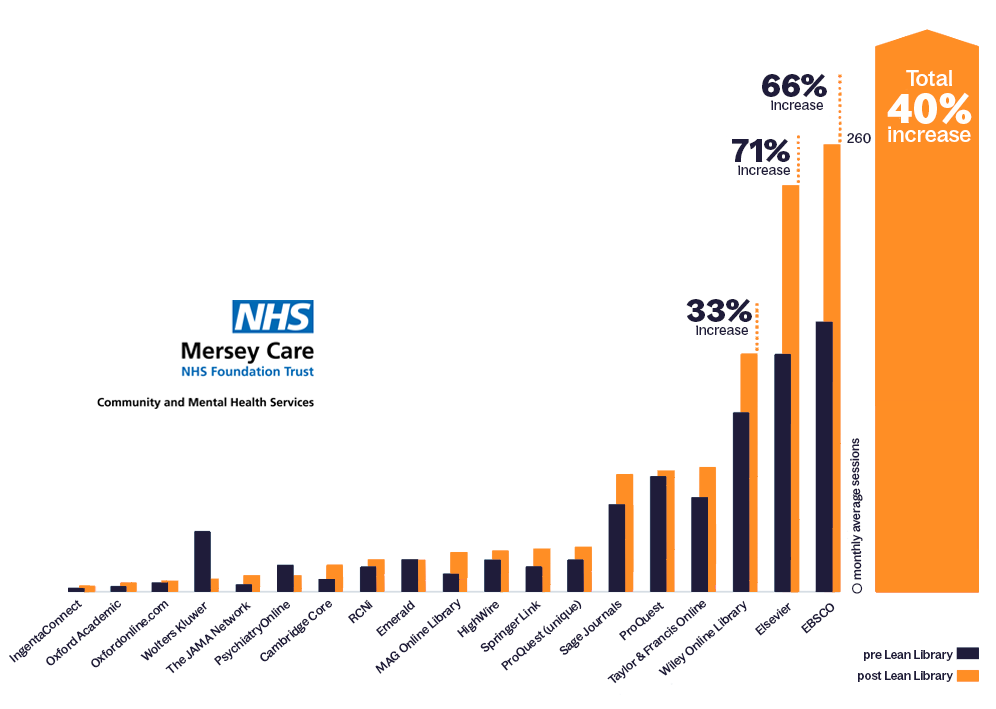
“The implementation of Lean Library in Mersey Care has contributed towards a 45% increase in online journal usage.”
At the end of the day, users need to see the value, and their feedback is important.
“The feedback is uniformly positive – and it is reassuring to know that if for any reason the user did not want to see the popups anymore, we can give them instructions on how to easily disable it.”
|
Find out more about Lean Library.
If you’d like to hear more or receive a product demo, get in touch.
Congratulations to our Library of the Month, University of East Anglia! October 4, 2024Each month we select a Library of the Month to honour libraries who have been using our library technologies in interesting and innovative ways, from creating well-curated reading lists with Talis Aspire to encouraging uptake of the Lean Library browser extension amongst their students. We’re also appreciating the intensive work of librarians in curating these technologies and improving learning outcomes for their students.
The winning library will be awarded a prize to share amongst their team or a donation to a charity of their choice as a way for us to say thank you.
The University of East Anglia (UEA) is a vibrant campus, based in Norwich, United Kingdom, and home to global community pursuing personal and professional success. We love working with the University of East Anglia; whether it’s collaborating on webinars to promote student engagement, or as development partners to improve the Technology from Sage product offering.
We’ve awarded them our Library of the Month Award for October, as they’re great advocates of Lean Library, and Talis Aspire, and put their students at the heart of everything they do.
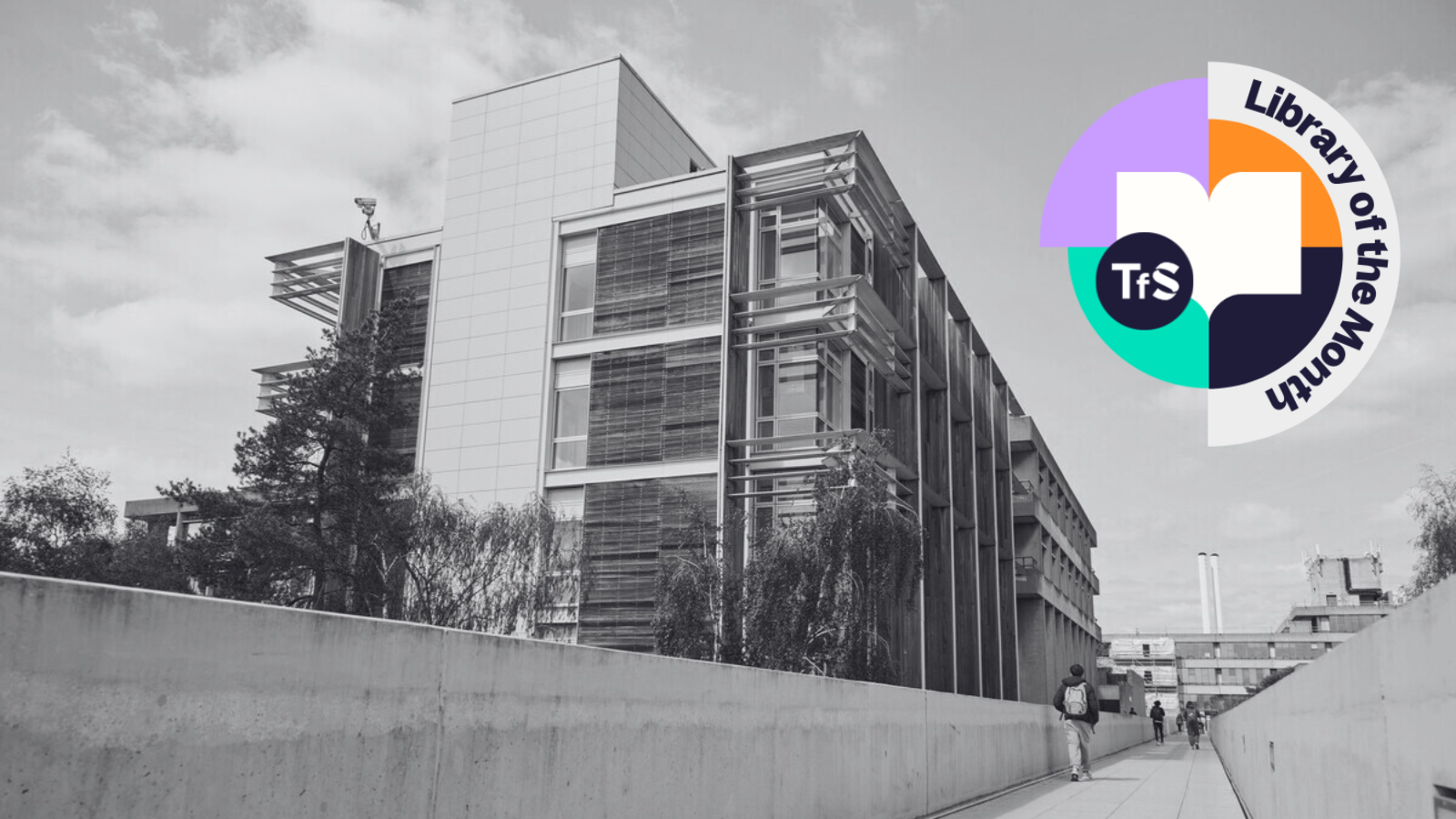
We asked Alli Carroll, Electronic Services Manager at the University of East Anglia to tell us more about the university library and what winning Library of the Month meant to them:
“The University of East Anglia Library is at the heart of our beautiful Norfolk campus. With our digital-first approach to resource provision and collection development, our goal is to make content accessible and available to our users wherever they are, bringing the UEA Library to them. We strive to support our staff and students in pursuing their personal and professional success.
Talis Reading Lists and Lean Library play an important role, as part of our suite of digital tools, in supporting teaching, research and point-of-need guidance here at UEA.
The UEA Library is delighted to be awarded ‘Library of the Month’ by Technology from Sage. We are keen advocates of Lean Library and Talis Aspire, and look forward to our continued relationship as customers, users, development partners and the Technology from Sage Community.” – Alli Carroll, The University of East Anglia.
Discover our previous winners below:
Could your library be next?
Join us next month to see who’s won.
Enhancing User Experience with Talis Aspire: 11 Updates for Improved Workflows October 1, 2024One of our key values at Technology from Sage is librarians at the heart. This means ensuring that librarians have an optimal experience whilst using our learning technologies, including our resource list management system, Talis Aspire. We continually strive to accommodate and adapt to the diverse working styles of the librarians, teachers and students utilizing the Talis Aspire platform.
Read on to discover the 11 Talis Aspire updates we’ve been working to improve workflows and usability for both librarians and patrons.
Librarians can now export from an archived or draft list to CSV, RIS, and PDF formats. This process follows the same principal as a Published list, allowing librarians to share entire lists and bibliographies as documents with faculty.
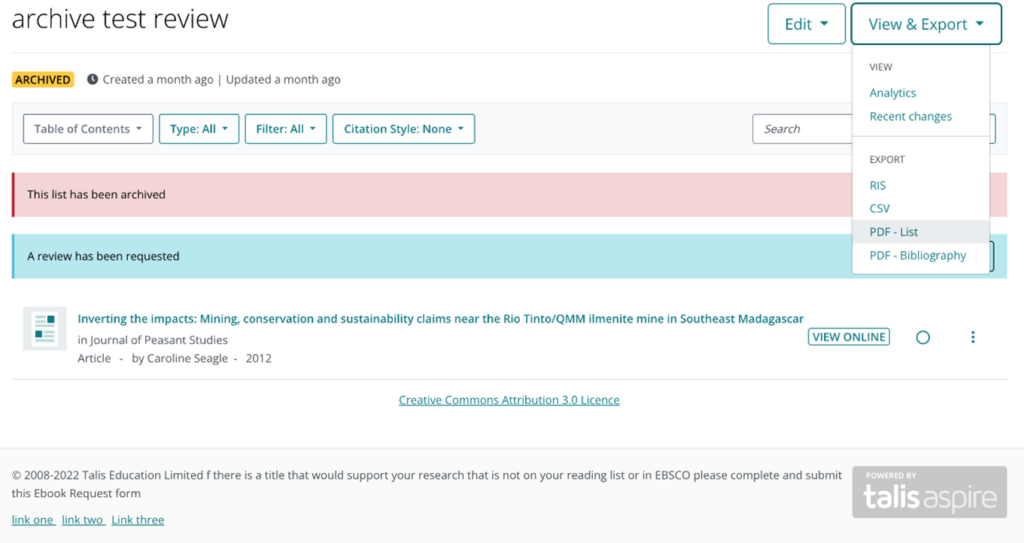
Users without a profile who receive an invite to become a list publisher are now first taken to the profile creation screen and immediately after redirected to accept the invite, removing the risk of leaving the invitation unaccepted.

Users are now able to filter items within a list that include a note from the library. This streamlines checking items which require actions when preparing for the next time the course is offered.
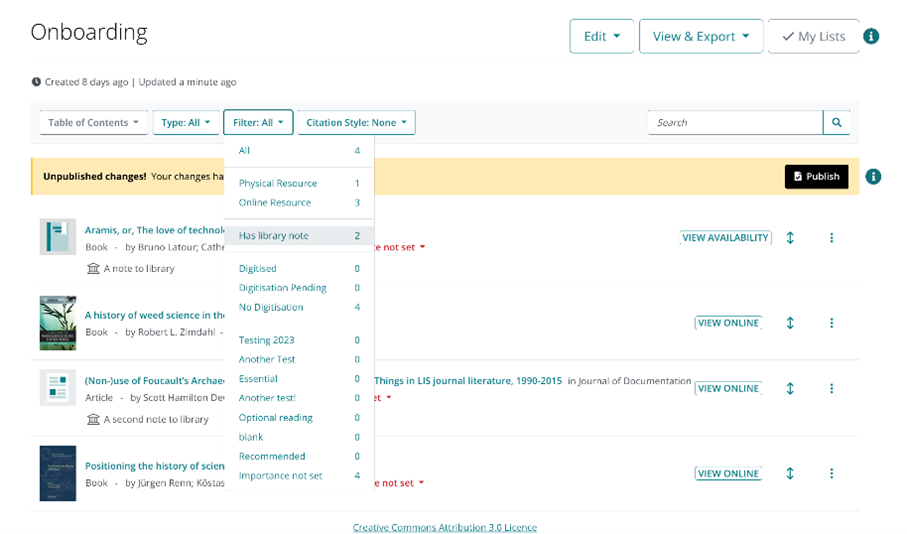
Articles and book chapters now include additional metadata as part of CSV and PDF exports. The title and volume authors or editors of articles and book chapters are now included, providing consistent bibliographic information with correct referencing and improved item discoverability.
CSV

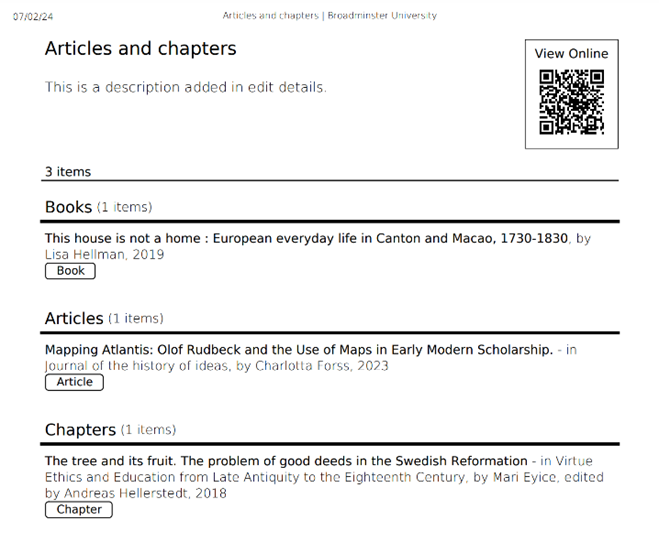
Talis Aspire onboarding guides for academics and librarians have been updated and expanded, appearing every 30 days on their reading list homepage. If you’re a Talis Aspire customer and want to make any changes to the frequency in which guides appear for your institution, please contact the support team.
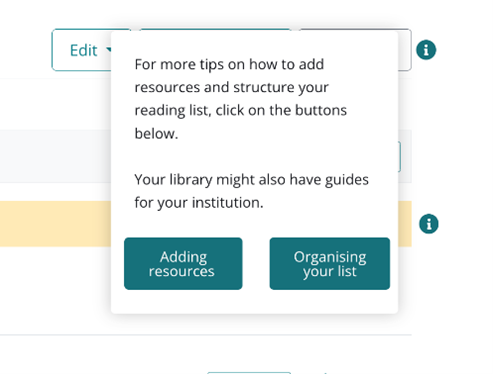
The Google Preview button has been relocated, now appearing within an item’s information, under the Alternative availability section.

Institutions using Talis Aspire Copyright Clearance or the DCS integration can now add internal messages in digitization requests. The free-text field allows notes to be added, providing context for the person receiving the request.
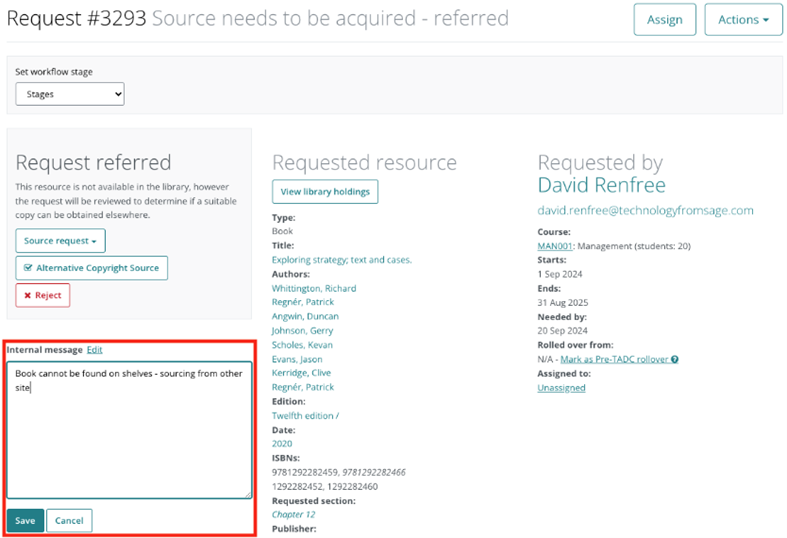
The process of reporting broken links has been redesigned, making it much more intuitive for a broken link reporter to add as much information as possible, streamlining the whole process. The screen displayed will vary depending on whether the user reporting the broken link is logged into the system.
When a user is logged in:
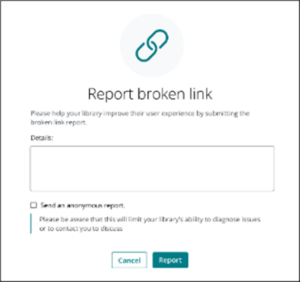
Users have access to a free text box where they can provide detailed information to help resolve the issue. The system automatically captures the reporter’s email for librarians to reach out if additional details are required. Additionally, users have the option to submit their report anonymously.
When a user is not logged in:
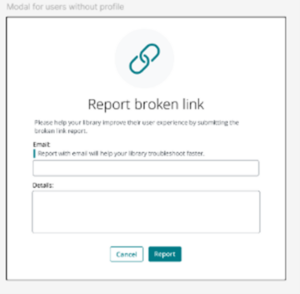
When a user is not logged in, they can use a free text box to describe the issue in detail and have the option to provide their email address, allowing librarians to contact them for further information if necessary.
Reading lists can now be searched by an instructor’s name, even if they aren’t the list owner. This enables students to find reading lists using their instructor’s name, without needing the precise course code or title.
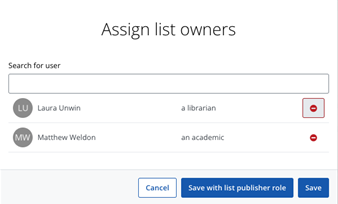
List creators can now leave internal notes for entire reading lists, facilitating communication with other faculty members and library staff without these notes being visible to students.
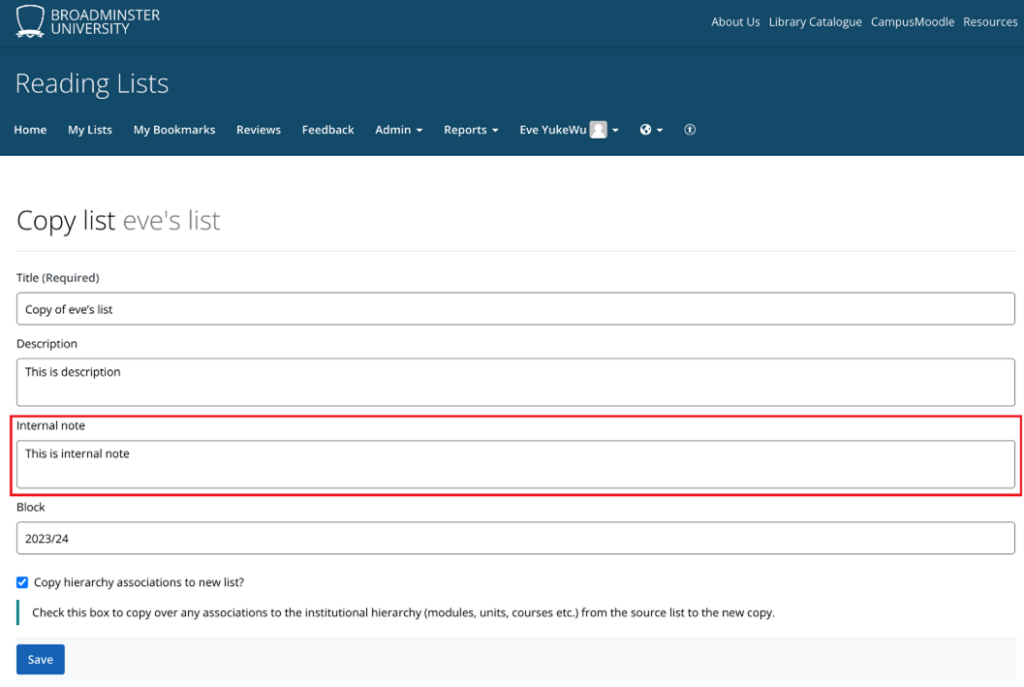
List Status
List editors can now better understand the status of their list. We’ve added a status label and information text under the list’s title:

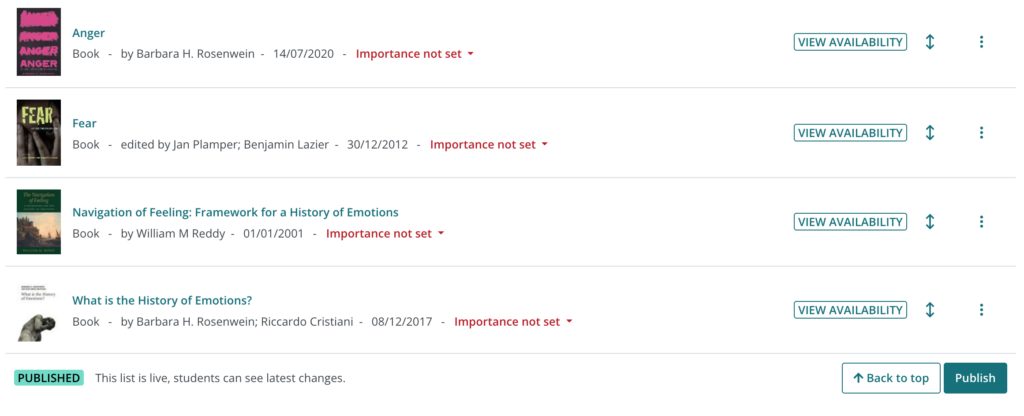
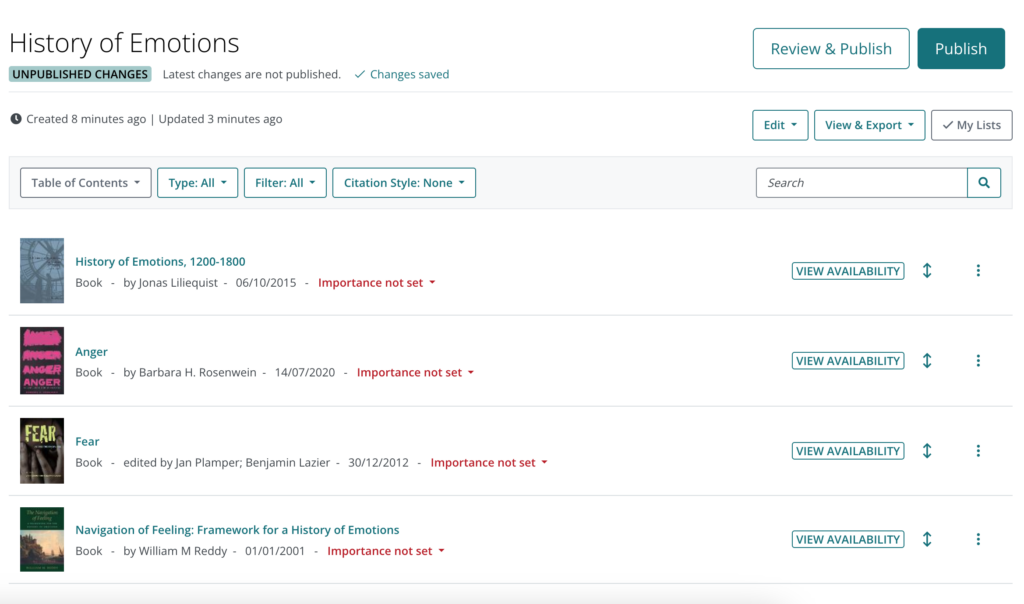
The status label and text changes immediately when a change to the status of the list is made.
Button Redesign
We’ve added a new feature which has long been requested by our Talis Aspire users. When editing a list, users will now always have a reminder on screen that they need to publish any edits that they’ve made, and access to a button to allow them to do so quickly. Examples of how this appears can be seen above.
Keep an eye out as we’re about to add buttons for “Review and Publish” and “Review” to the list footer.
Want to try Talis Aspire for yourself? Get in touch with us to get a customized demonstration.